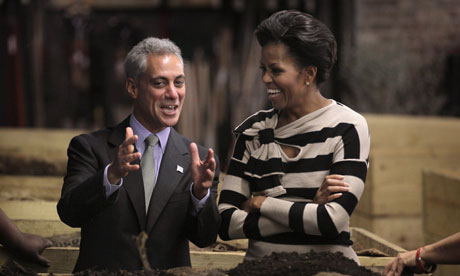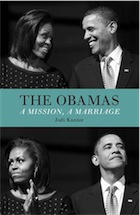A biography with the First Lady at its heart

First lady Michelle Obama chats with Chicago mayor Rahm Emanuel. Photograph: Scott Olson/Getty Images
In her acknowledgments to The Obamas, her account of the first couple's first three years in the White House, journalist Jodi Kantor thanks her New York Times editor for "a four-year conversation about ambition, power, gender and public life". That conversation is, in a real sense, the subject of this book. She tells of interviewing the Obamas in the Oval Office in September 2009, and asking them how a marriage can stay equal if one of the spouses is the president. "The first lady," observes Kantor, "let out a sharp 'hmmmpfh', as if she were relieved someone had finally asked, then let her husband suffer through the answer. It took him three stop-and-start tries."
 A former White House correspondent, Kantor has interviewed 33 White House sources, as well as the Obamas (although not since 2009 and not specifically for this book). The result is less a biography than an extended profile of Michelle Obama: her husband, naturally, plays a definitive role, but Michelle is at the book's heart. In the acknowledgments, Kantor mentions a woman who "insisted Michelle was perfect and that if I told her otherwise her world would collapse". The woman's world is, presumably, still intact: the Michelle who emerges from these pages may not be perfect, but she is certainly impressive, fully deserving of the admiration she has inspired in so many.
A former White House correspondent, Kantor has interviewed 33 White House sources, as well as the Obamas (although not since 2009 and not specifically for this book). The result is less a biography than an extended profile of Michelle Obama: her husband, naturally, plays a definitive role, but Michelle is at the book's heart. In the acknowledgments, Kantor mentions a woman who "insisted Michelle was perfect and that if I told her otherwise her world would collapse". The woman's world is, presumably, still intact: the Michelle who emerges from these pages may not be perfect, but she is certainly impressive, fully deserving of the admiration she has inspired in so many.
The Obamas is not quite a domestic biography, and not quite a political one. It's what might be called a biography of domestic politics: it's about the balance of power in a marriage between two exceptional people; the politics of living in the White House; and the Obamas' efforts to shape US domestic policies. One of the book's effects is thus to reinforce the common impression of a nation, and a White House, focused almost exclusively on domestic issues – the Arab spring is never mentioned, for example. But then a politician like Obama, whose success derives from a cult of personality, is going to find it difficult to separate the personal from the political.
Although it gestures back towards each Obama's past, the story really only spans the three years of their occupancy of the White House. Much of the book concerns Michelle's attempts to find a way for the East Wing – as the first lady's staff and agendas are known – to work harmoniously with the West Wing. Kantor's reports of tension and miscommunication between the two staffs have been labelled "controversial" in some of the book's advance press, and the White House has hit back sharply, saying Kantor is "overdramatising old news". But what emerges from Kantor's account is neither particularly controversial, nor particularly dramatic. Anyone would predict a period of adjustment as people unaccustomed to working with large domestic and professional staff learned how to communicate through and with them, while raising two children and oh, yes, running the country. Political aides sometimes swear when they're frustrated, even about the first lady? The famously rancorous and divisive Rahm Emanuel was rancorous and divisive? Astonishing.
Full review at The Guardian.
Footnote:
Penguin Books NZ have advised me they will release this title on 25 January.
 A former White House correspondent, Kantor has interviewed 33 White House sources, as well as the Obamas (although not since 2009 and not specifically for this book). The result is less a biography than an extended profile of Michelle Obama: her husband, naturally, plays a definitive role, but Michelle is at the book's heart. In the acknowledgments, Kantor mentions a woman who "insisted Michelle was perfect and that if I told her otherwise her world would collapse". The woman's world is, presumably, still intact: the Michelle who emerges from these pages may not be perfect, but she is certainly impressive, fully deserving of the admiration she has inspired in so many.
A former White House correspondent, Kantor has interviewed 33 White House sources, as well as the Obamas (although not since 2009 and not specifically for this book). The result is less a biography than an extended profile of Michelle Obama: her husband, naturally, plays a definitive role, but Michelle is at the book's heart. In the acknowledgments, Kantor mentions a woman who "insisted Michelle was perfect and that if I told her otherwise her world would collapse". The woman's world is, presumably, still intact: the Michelle who emerges from these pages may not be perfect, but she is certainly impressive, fully deserving of the admiration she has inspired in so many.The Obamas is not quite a domestic biography, and not quite a political one. It's what might be called a biography of domestic politics: it's about the balance of power in a marriage between two exceptional people; the politics of living in the White House; and the Obamas' efforts to shape US domestic policies. One of the book's effects is thus to reinforce the common impression of a nation, and a White House, focused almost exclusively on domestic issues – the Arab spring is never mentioned, for example. But then a politician like Obama, whose success derives from a cult of personality, is going to find it difficult to separate the personal from the political.
Although it gestures back towards each Obama's past, the story really only spans the three years of their occupancy of the White House. Much of the book concerns Michelle's attempts to find a way for the East Wing – as the first lady's staff and agendas are known – to work harmoniously with the West Wing. Kantor's reports of tension and miscommunication between the two staffs have been labelled "controversial" in some of the book's advance press, and the White House has hit back sharply, saying Kantor is "overdramatising old news". But what emerges from Kantor's account is neither particularly controversial, nor particularly dramatic. Anyone would predict a period of adjustment as people unaccustomed to working with large domestic and professional staff learned how to communicate through and with them, while raising two children and oh, yes, running the country. Political aides sometimes swear when they're frustrated, even about the first lady? The famously rancorous and divisive Rahm Emanuel was rancorous and divisive? Astonishing.
Full review at The Guardian.
Footnote:
Penguin Books NZ have advised me they will release this title on 25 January.
No comments:
Post a Comment